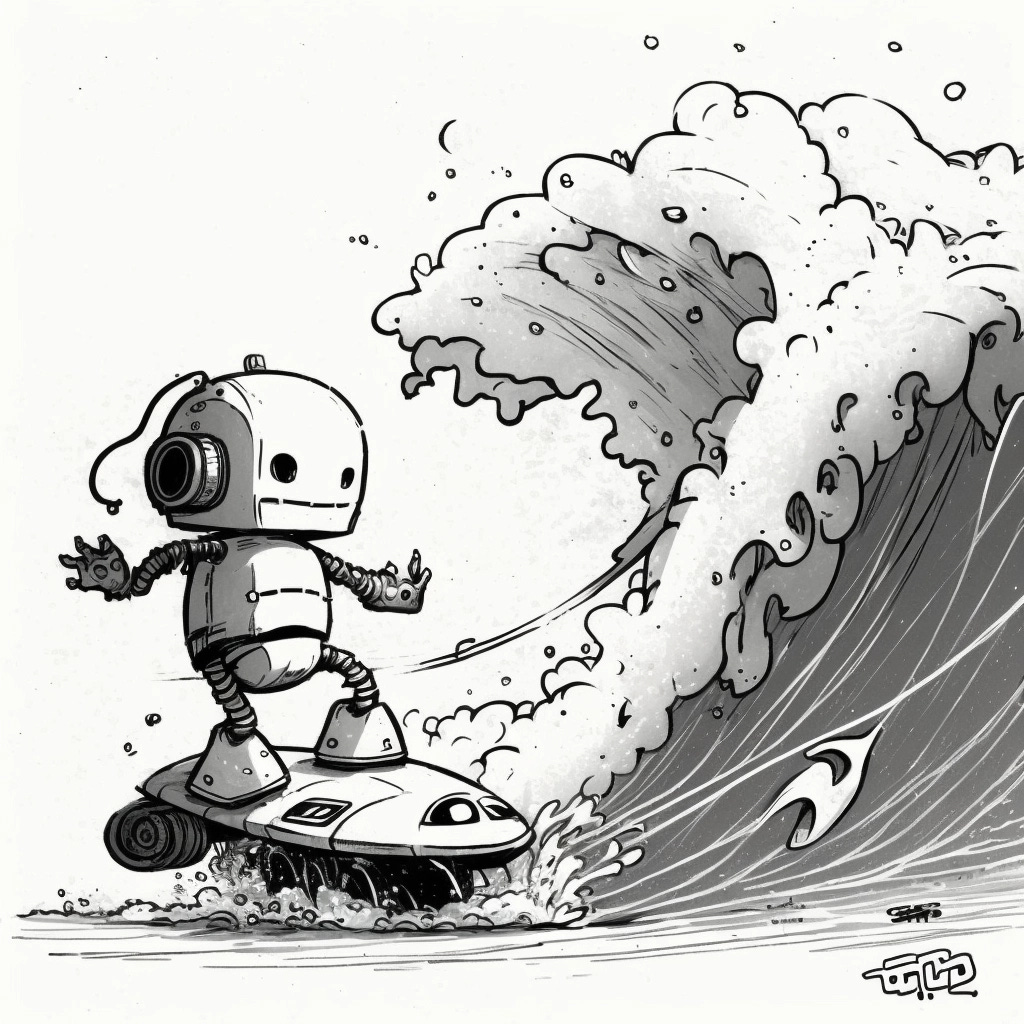The AI Tsunami: Riding the Wave of Change
Like it or not, generative AI will transform the work of mission-driven organizations. AI Impact Lab will track and share best practices and pitfalls alike.
Welcome to AI for Good, the newsletter of AI Impact Lab. I’m starting this organization and this newsletter because rapid advances in artificial intelligence will bring about transformative change to our society over the next 5 years, and I want to help mission-driven organizations adapt to and capitalize on AI to achieve vastly more impact.
A recent Goldman Sachs report states that "generative AI could substitute up to one-fourth of current work." And it’s not just speculation: Two academic studies released in early 2023 (not yet peer-reviewed) ran controlled trials of the impact of generative AI on productivity. The results are WILD — practically unprecedented in productivity research:
Software developers using GitHub Copilot, an AI pair programmer, completed their tasks 56% faster than those without the tool.
When experienced knowledge workers (marketers, grant writers, consultants, data analysts, human resource professionals, and managers) used ChatGPT for occupation-specific writing tasks, they completed those tasks 37% faster — and with higher quality.
These statistics paint a clear picture: Generative AI will transform the way people work over the next decade.
Generative AI will transform the way people work over the next decade.
This statement does not require speculation on future development of the technology. It is true of technologies that already exist, but have developed their current potential so quickly that the implications have not yet propagated through workplaces and the economy as a whole.
This statement also doesn’t imply a particular value judgment. You can think the impacts of generative AI will be terrible and oppressive, or you can be ecstatic at each new tool’s release, and either way believe that the effects on workplaces will be enormous.
ChatGPT and similar technologies are the offshore earthquake; the changes that will hit workplaces are the tsunami wave that is already on its way — still imperceptible to many people, but inevitable.
ChatGPT and similar technologies are the offshore earthquake; the changes that will hit workplaces are the tsunami wave that is already on its way — still imperceptible to many people, but inevitable.
This tsunami has the potential to revolutionize the work of social impact organizations. At the macro level, it could turn into a rising economic tide: It could provide quality medical care to billions of people, level the playing field on what economic opportunities one has based on what languages you grew up speaking, make it possible to deliver social services at much lower price points, and much much more.
Or it could be destructive: The generative AI tsunami could put hundreds of millions of people out of work, centralize economic power even further in the hands of a few oligarchs, cement racial discrimination, or even contribute to future pandemics and wars.
It could even do both.
I don’t know whether the macro-utopian or macro-dystopian scenarios are more likely — and yes, that freaks me the eff out. But as a veteran of two decades of social change work, there’s one thing I feel certain of: A more effective social impact sector makes better scenarios more likely — not just on this set of issues, but on every set of issues I care about, from climate change to education to housing.
And at the more micro level, from an organization’s perspective, I am convinced that generative AI will transform the way all organizations work, with the potential to make the mission-driven organizations I care about much more effective and efficient.
Just to scratch the surface, I believe that generative AI technologies that already exist can and will:
Dramatically enhance social impact organizations’ strategic and management capacity,
Massively streamline marketing and fundraising workstreams,
Save oodles of staff time on paperwork and internal communication,
and much more.
The debates about whether AI will be catastrophic or beneficial are being had, and I am following them with interest. But I’ve seen a big gap in the discourse: Practical advice for mission-driven organizations who want to navigate the generative AI tsunami effectively.
I’ve seen a big gap in the discourse: Practical advice for mission-driven organizations who want to navigate the generative AI tsunami effectively.
With nearly 20 years of experience in social impact work spanning five continents, I founded AI Impact Lab to bridge this gap between the world of generative AI, and its practical implications for social impact organizations. I am excited to introduce this newsletter, AI For Good, which will serve as a platform for sharing insights, opportunities, and challenges associated with AI and the social impact sphere.
In AI For Good, you can expect to find:
Balanced perspectives on the latest AI advancements and their applications in social impact fields,
In-depth case studies showcasing responsible implementation of AI tools in mission-driven organizations,
Expert recommendations on the most practical and ethically-aligned AI tools tailored to your specific needs,
Strategies to address potential risks and challenges associated with AI adoption, and
Updates on workshops, coaching opportunities, and other resources to empower your team.
I invite you to join me on this journey as we explore the world of AI together, seeking to harness its potential for good while acknowledging and addressing the risks and challenges it presents.
Welcome to the tsunami,
Taren Stinebrickner-Kauffman Founder, AI Impact Lab



